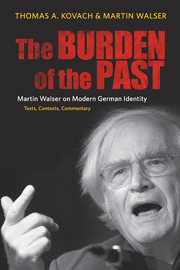Book contents
- Frontmatter
- Contents
- Acknowledgments
- The Burden of the Past
- Introduction
- Our Auschwitz (1965)
- No End to Auschwitz (1979)
- Handshake with Ghosts (1979)
- Speaking of Germany (A Report) (1988)
- Experiences while Composing a Sunday Speech: The Peace Prize Speech (1998)
- On Talking to Yourself: A Flagrant Attempt (2000)
- Conclusion
- Suggestions for Further Reading
- Index
On Talking to Yourself: A Flagrant Attempt (2000)
Published online by Cambridge University Press: 05 February 2013
- Frontmatter
- Contents
- Acknowledgments
- The Burden of the Past
- Introduction
- Our Auschwitz (1965)
- No End to Auschwitz (1979)
- Handshake with Ghosts (1979)
- Speaking of Germany (A Report) (1988)
- Experiences while Composing a Sunday Speech: The Peace Prize Speech (1998)
- On Talking to Yourself: A Flagrant Attempt (2000)
- Conclusion
- Suggestions for Further Reading
- Index
Summary
Context
THE WALSER-BUBIS DEBATE, OCCASIONED BY Walser's Peace Prize speech and Bubis's ensuing accusation that Walser had made inflammatory remarks, is widely considered the most prominent debate regarding the German past and how it should be viewed by Germans today since the Historian's Debate of the mid-1980s. Though at first it seemed that Bubis was alone in his criticism of Walser's speech, his voice would soon be joined by many others who were similarly disturbed by the speech. The media reflected this turn as well, going from what was for the most part an uncritical celebration of Walser to what was at times a total demonization of him for alleged right-wing or antisemitic views. Though Walser, in this speech and elsewhere, had questioned the role of the public sphere, he clearly attached great importance to the support he received from many people (in his conversation with Bubis he made several references to the thousands of letters he had received in support of his stance), and he was likewise deeply wounded by the criticisms he received, and he expressed his anger, notably in a lecture at the University of Duisburg, at what he felt was a total misunderstanding of what he had said.
Information
- Type
- Chapter
- Information
- The Burden of the PastMartin Walser on Modern German Identity: Texts, Contexts, Commentary, pp. 107 - 128Publisher: Boydell & BrewerPrint publication year: 2008
